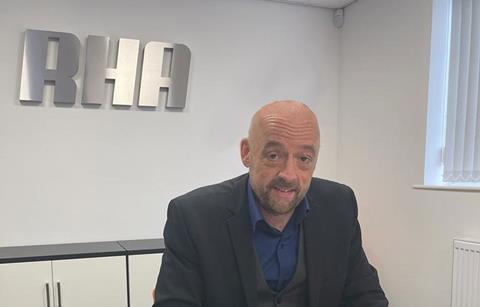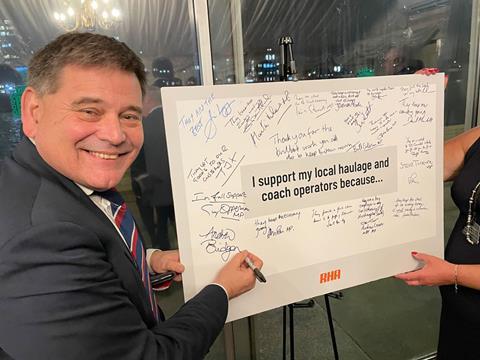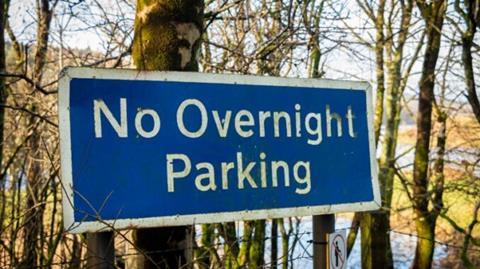At its well-attended Parliamentary reception at the Palace of Westminster in January, the RHA launched its ‘Driving growth, delivering for the country’ manifesto for the next general election, widely expected to be in autumn this year.

The document pulls together key policy asks and recommendations to help the sector deal with some of its many challenges.
These include:
• Relieving the tax burden to support economic growth
• An emissions-linked fuel duty rebate
• A Net Zero roadmap
• Roads investment
• Planning reform to secure more driver facilities
• Reforms to plug skills gaps
RHA MD Richard Smith spoke to MT about the work the association is doing behind the scenes to get politicians of all the major parties up to speed about the serious issues the haulage sector is facing, especially the one to 20-vehicle haulier that the RHA typically represents.
As well as developing better working relationships between the RHA and government ministers, since he became MD in 2021 Smith has worked hard to build bridges with other logistics trade associations.
So, in addition to its own election manifesto, the RHA has collaborated on the development of a joint manifesto with ten other trade associations covering the wider logistics industry, including warehousing, ports, airports and rail, in which the RHA will represent the voice of road transport.
Economic growth is probably the biggest deliverable hauliers want from government, as rising volumes take pressure off rates and help absorb the high inflation still being seen in operating costs. As part of a survey of members the RHA undertook along with Logistics UK and express freight association AICES into the Direct Vision Standard (DVS), it asked “what is the state of health of your business?”
An alarming 50% said margins are tight and they face an uncertain future while a further 9% said they expected to go bust in the next six months. Only 30% said their fleet was fully operational and profitable.
A majority of operators do not plan to upgrade their existing fleets to the new DVS specification coming into force in October 2024 but will avoid the capital until the next buying cycle brings new vehicles that will achieve the necessary 3-star rating from the factory.
An even bigger majority said they did not fully understand what equipment vehicles need to be fitted with under DVS phase 2, which will require the elimination of blind spots down the nearside of all vehicles including artics and a moving-off information system to warn drivers of vulnerable road users in front of the cab.
“The message we are getting back is that things are tight and there is no money to invest,” says Smith. “DVS may only cost £1,000 per truck but for some larger operators that is £2m. I had a very angry member with 80 trucks asking me ‘what are you doing about this?’
“We’ve asked TfL to extend the grace period to comply to 18 months and to clarify the technical specifications so that hauliers know they’re buying the right kit. I have told Seb Dance [deputy mayor for transport and deputy chair of TfL] that this could seriously affect service levels in London and with a mayoral election coming we have a chance to get them to listen.”
In the spring budget on March 6, the government continued the freeze on fuel duty, but ignored pleas from the industry to cut duty on renewable fuels such as HVO and biomethane to reduce the price premium over fossil fuels.
In discussions with Smith, Anthony Browne MP, transport minister responsible for decarbonisation, maintained the government line that the road map to net zero was for the industry to draw and market forces would decide which route to take.
“I explained that government has to get involved because ministers set the framework that the industry operates under,” Smith says. “We are not asking for a diesel rebate, we are asking for a fuel rebate. Whether you are using HVO, electric or diesel, there should be an essential user rebate that incentivises organisations large and small to move to HVO or gas. We need to see that so people start to believe this is real.”

Smith also knows that as diesel use starts to dwindle the government will need to find a way to replace the existing £37bn annual revenue from fuel duty.
“These are conversations we need to start having now,” he says. From a transport perspective we need to keep driving the message home because it is not viewed as important compared to all the bigger issues like health, food and drink – although we influence all those areas
“Politicians only take notice of transport and logistics when things go wrong.”
On net zero, the RHA knows that this will be challenging for its members given that the electric vehicles currently coming to market are much more expensive than their diesel equivalents.
“The forward-looking haulier who wants to stay in the industry has got to start making those decisions,” Smith says. “We need to support that from a lobbying perspective to make sure there is clarity, certainty and appropriate government support around the net zero plan.
“Where is all this electricity coming from? And it won’t be electric for everybody because it can’t be. If you are trunking up and down the country or carrying heavy loads like aggregates how will the vehicles have the same like-for-like power?
“There won’t be a one-size-fits-all solution.”
Smith believes that one inevitable side effect of decarbonising road freight transport will be more, smaller trucks on the roads as electric vehicles will not be able to carry the same payloads as far as the current fleet of diesel vehicles. That will lead to lower efficiency and higher costs which will have to be paid ultimately by consumers, adding further inflationary pressure when the government is pulling every lever it can to bring down the rate of price increases.
“I am a great believer that market forces will always prevail in whatever we do,” he says. “This will only go as fast as is driven by demand. If all hauliers presented their customers with a ‘green’ rate card and we want it tomorrow, it would cause panic in the marketplace.
“I think these things will move in steps and while government needs to give some direction ultimately the consumer will decide how quickly it moves. The whole country has to move as one otherwise there is a risk it will become fractured.”
This is why the RHA launched its Net Zero Forum last year - “to get the industry to believe there is an alternative to diesel” as Smith puts it.
The government’s latest set of trials – the ‘Zero emission and hydrogen infrastructure demonstrator’ (Zehid) programme launched last October - has received £200m funding for four collaborative projects that will see 370 zero-emission HGVs put on the road along with the associated refuelling and recharging infrastructure.
“My understanding is that only one of those four is anything like in shape and the others are still in the early formative stages,” says Smith. “I have told the DfT it is important that as the results start coming out in the next two or three years they are shared with the industry. If not there will be more suspicion and scepticism, and hauliers will just retreat into their diesel bunker.”
When it comes to improving driver facilities, the RHA has long called for more investment in secure HGV parking along the UK’s major trunk routes, as a shortage of capacity is forcing drivers to overnight in unsafe places.

In February the government responded with the launch of a cross-party task force to look at the availability and standard of truck parking, bringing together the RHA, Logistics UK and other industry associations.
Last year the government allocated £100m to provide up to £315,000 in match funding for the development of truck parking. Roads minister Guy Opperman MP has said that the government and industry are together improving 38 truck stops thanks to £16.5m investment through this HGV parking and driver welfare grant scheme.
“We are very pleased about that and with the engagement we are getting on social media with drivers,” says Smith. “Around half of the £100m match funding has already been allocated and there are about to be more announcements on more money to come as a result of savings from the cancellation of part of HS2.”
Seeking consistency on abnormal loads
On top of its pre-election campaigning, the RHA has been coordinating efforts by operators and other associations to get more consistency across the UK when it comes to the rules and procedures for moving abnormal loads.
At present each of the UK’s 43 police forces set their own procedures for moving abnormal loads across their patch, and the RHA last year convened a working group with the National Police Chiefs Council to try to develop national guidelines for police officers and operators.
“We are reviewing the police guides now and hopefully over the next 12 months we will get some realism brought to the job,” says Smith. “One example of the inconsistencies across the UK is that in Greater Manchester any load with an overhang of more than 4.2m – which could be a mobile home – has to have an escort. This is disastrous as it drives up costs and makes it totally inoperable.
“If a haulier goes from Scotland to Devon, every county has a different process. How is that efficient?”














